#The Specter of the Revolution
Explore tagged Tumblr posts
Text

Georges d'Ostoya - The Specter of the Revolution, 1921.
4 notes
·
View notes
Text

You know what? … I’ll allow it. With the power invested in me as a child of the American revolution, I declare Emmy an American citizen.
#professor Layton#professor Layton and the last specter#Emmy altava#this post is a liiiittle misleading#I’m not actually a member of either the daughters or the sons of the American Revolution#could be tho#I’m actual eligible for a bunch of those groups#actually the AR one is kind of funny#because my mom’s side of the family were Americans who fought in the revolution#but my dad’s side#which comes from England#were redcoats#so I’m actually a child on both sides but in different ways haha#queue takumi defense squad
16 notes
·
View notes
Text
The Neoterics?
Made for the masterpost.
Now you may ask yourself? What's Neoteric: Anarchy and Neoteric; Eminence? What's the difference. Well, to put it simply, Anarchy is during the Empyrean War, Eminence is the epilogue. There are technically 4-5 Neoterics. I don't exactly remember the names. Because I am far too burnt out (and busy from college) to write out EVERY Neoteric, this tumblr will tag accordingly to what period of time this was (usually)
Neoteric: Premonition: Prologue, Static's POV
Neoteric: Specter: War beginning, Amp's POV
Neoteric: Anarchy: Mid-war, Crescendo's POV
Neoteric: Revolutions: War ending, RK's POV
Neoteric: Eminence: Epilogue, LOCK's POV
NOTE: Just because they are in a character's POV doesn't mean they are confined, it mostly determines the time period. The POVs are meant for the concrete stories, not the side drabbles.
#neoteric: eminence#neoteric: anarchy#neoteric: premonition#neoteric: specter#neoteric: revolutions#worldbuilding#scifi
2 notes
·
View notes
Text
i dont care about harvey specter anymore. where's alex williams. why isn't he currently fucking louis litt, hes a cat man after all! his first big plotline was harvey being jealous that his bestie wants to spend time with ew gross louis litt. why isnt this occurring as we speak.
#suits usa#alex williams#louis litt#look. if the fandom is restarting then im here to stir up drama#or perhaps. revolution#harvey specter#JUST EDITED THIS FROM HARVEY D*NT TO HARVEY SPECTER. I PROMISE I KNOW THE NAMES OF SUITS CHARACTERS
4 notes
·
View notes
Text
It Was Never Jinx's War
**Spoilers For Arcane**

I have written quite a bit about Jinx, and touched on this topic briefly, but I felt that it deserved more than my sarcastic blurbs. Today I wanted to talk a little bit about Jinx, and her being forced into the role of a revolutionary by her people and fans alike. So what do I actually mean?
I mean to address statements like these from fans:
Jinx should have lead Zaun in a civil war!
Jinx should have ripped Caitlyn apart!
The writers are coward for making Jinx apologize to Caitlyn!
What did they do to Revolutionary Jinx?! She was meant to lead the uprising!
I'm not going to spend time going through her whole story again. I have done so many times in various forms as have many others. And I have to assume if you are on Tumblr reading some grouchy nerd's rambling about Jinx, you already know her story. So first let's discuss one question.
Does Jinx hate Piltover/The Enforcers?
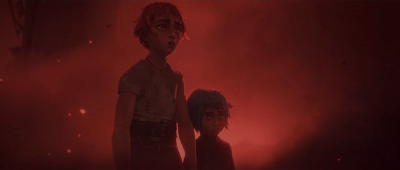
OBVIOUSLY. And she has every reason to. Growing up as a Zaunite means she grew up suffering under Piltovan oppression. And the Enforcers took her parent's lives. Take Silco and his teachings totally out of the picture and Jinx still has every reason to feel how she feels. I don't deny that at all. But feeling that way is not the same as being a violent revolutionary for her own reasons and choices. So let's discuss the moments from season 1 that created this false idea that the Jinx we know was fighting for her people's freedom with what she did.
SEASON 1
As A Kid:
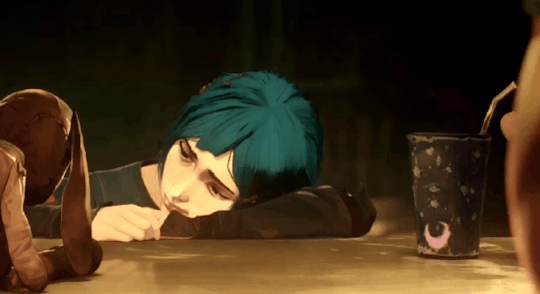
It probably seems silly to most of you, it certainly did to me. But I have legitimately seen the example used that Powder was making bombs and had filled one with nails for the Enforcers to justify this idea. Listen folks, she was 11. I'm not saying she didn't want to help her family or wasn't willing. But equating that with wanting to be part of a violent revolution is foolish. In fact we see that childish (not said negatively just honestly) enthusiasm without consideration of consequence play out when she tries to help save Vander.
2. The Theft:
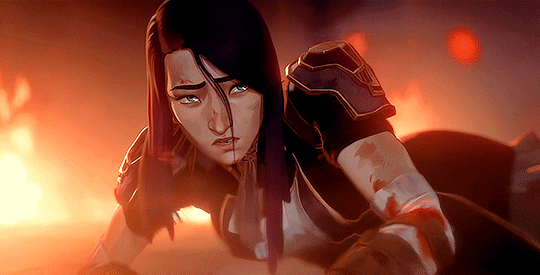
Okay. So this is her first real act as Jinx that I have seen attributed to her being a revolutionary for Zaun fighting the system. Most of the justification for this comes down to the simple fact that she stole from Piltover and hurt Enforcers. Jinx lights a building on fire, drawing Enforcers in using a fake child's voice, then blows it up killing six Enforcers and stealing the hex-tech gemstone. What does that mean?
Stole a source of power from Piltover that gives Silco and opportunity to study hex-tech
Killed Enforcers
Okay. I can see the revolutionary point for sure. Except for one problem. Jinx didn't do any of this for Zaun. Let's roll the tape!
Our reintroduction to Powder who has now become Jinx is the fight between Silco's people and The Firelights on Progress Day. During that incident Jinx sees a firelight that resembles Vi and loses control. This leads to conflict with Sevika.
Later, Sevika and Silco are discussing what happened. Sevika is angry:
Sevika: "She's a problem and we all know it" Silco shuts her down. It is then revealed Jinx has been listening the entire time and she talks with Silco: Jinx: "one of those firelight wackos was a girl with pink hair" Silco: "todays screwup will set us back weeks" Jinx: "I'm sorry" Silco: "I need to know I can rely on you..... Sevika will clean up todays mess" Jinx: "Sevika? That ogre couldn't clean a dust bunny with a blow torch" Silco: "Take some time" Jinx: "I don't need time" Silco: "Take it anyhow"
Jinx is quite visibly upset and leaves

We rejoin Jinx later in her hideout. She is upset, convincing herself it wasn't Vi, talking to the specter of Mylo, justifying the incident that it was just her getting confused. then she says some key dialogue here:
"Now, he thinks I'm weak...I'm not weak... and I'm gonna show him. Oh, I'm gonna show him. You'll see".
And the explosion and theft are how she does so. How she proves to her adoptive father that she isn't weak. And it works! It gives her the validation she is desperate for. When he first comes in he is the most outwardly angry with her we ever see him on screen.
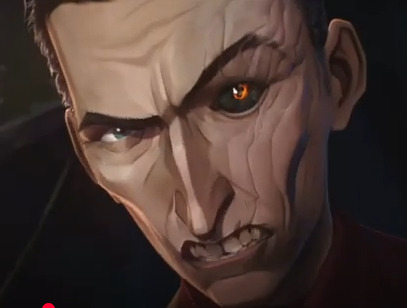
Until she shows him the stone:
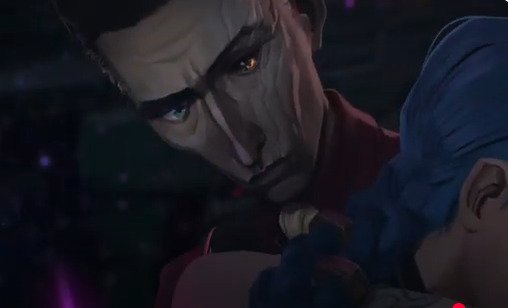
Silco values strength above all. We see him espouse this over and over. Jinx has certainly heard it plenty although unless I'm mistaken we don't see him preaching it directly to her until later. She is worried he sees her as lacking the most important quality to him, so she goes out and proves it and now she feels accepted and safe again. Not to mention the fact that her early childhood trauma left a very real mental scar in her regarding feelings of being weak/not ready/a Jinx. I mean come on, it isn't exactly subtle that the specter we see tormenting her more prominently than any is this fucker (calling the delusion that not the dead child. Don't yell at me lol)-
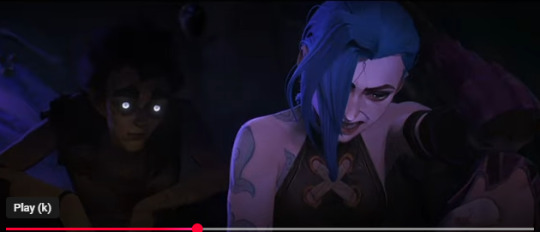
She didn't do any of this for Zaun. She did it because part of her is still a little girl that's terrified if she isn't strong enough she is going to be all alone.
3. The Bridge:
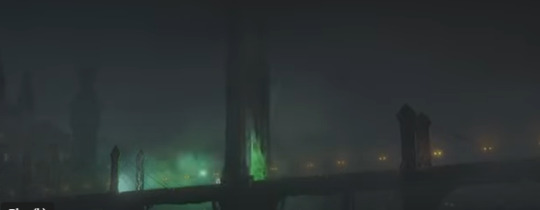
Alright moving on. The next big one that gets mentioned frequently is Jinx attacking the bridge. Again, I can see the argument to a point. Killing the leader of The Enforcers and reclaiming the stone. Definite points for the "Zaunite Revolution". Except for a few things.
She is watching the bridge when Vi says goodbye to Caitlyn & Ekko. Mostly just arguing with "Mylo" about Vi.
2. She doesn't look angry until she sees the stone. The stone that symbolizes Silco's acceptance and recognition of her strength, and therefore his love.
3. She doesn't attack when she sees the stone. she doesn't attack when Marcus shoots Ekko. She is overwhelmed by her mental illness and attacks when Vi "leaves her" again, running back toward the bridge after the gunshot.
4. The symbol of Silco's love is in jeopardy, and she feels like Vi is leaving all over again. Once more she is a little girl facing the terrifying prospect of being all alone again and it's quite simply too much. Look how big Mylo is over her.
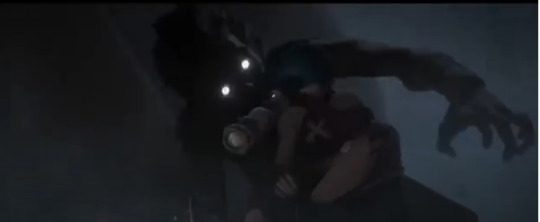
I mean this just isn't subtle. This was not the act of a freedom fighter assassinating an enemy. This was the act of a mentally ill young woman losing control and unleashing violence in an attempt to hold on to what she is terrified to lose.
4. Abducting Caitlyn:

Not much to say here but it is worth mentioning as it frequently gets filed under the "Jinx = Oppressed, Caitlyn = Oppressor, so Jinx abduct and possibly torture Caitlyn = Okeydokey Artichokey!" crowd. This didn't have a damn thing to do with Zaun. Because of Silco and Sevika's manipulations, Jinx's history with Enforcers, and Jinx's mental illness she viewed Caitlyn as the one keeping Vi from her and she acted out jealousy, fear and rage.
5. Attack On the Council:
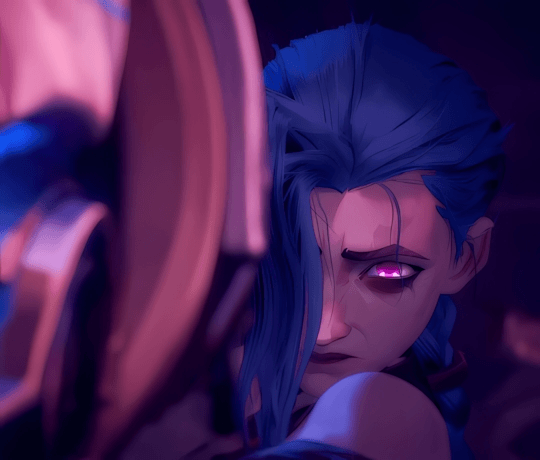
Ok. This is in the big one that is probably the most hotly debated. By now we all know the context here. Jinx has abducted Silco, Vi and Caitlyn to host her dinner party. Silco is now dead, and in a moment of "accepting" who she is Jinx strikes at the Council of Piltover, unknowingly during the very moment they are ratifying Zaunite independence.
Silco's words echo over the strike while the hauntingly beautiful "what could have been" plays. It is truly a moving moment and all sarcasm or nastiness aside let me say that I do understand how people are interpreting this scene the way they are.
Jinx sits in the chair seemingly accepting herself as the daughter of Silco and inheritor of his legacy
Vi blames herself for creating jinx. The camera cuts to Vi multiple times during the song.
Jinx gives the whole "I thought you could love me like you used to" speech. Onece again just piling onto Vi and implying Jinx knows who she is now.
Jinx is clearly remorseful for shooting Silco and striking at his enemies would be a logically fitting way to respond
However, it is not that simple. Jinx is not making the first strike for her people in the wake of her adopted fathers death. She is a grieving, enraged, and yes mentally ill young woman in the middle of a breakdown lashing out at a symbol of pain and loss in her world.
I recently wrote a short sarcastic little blurb about this and that was my bad. This topic deserves more. But someone responded that I was implying Jinx was not capable making plans or decisions in that moment because of her mental illness. That is not what I mean. What I mean is that Jinx's heart and mind are an open ragged wound in this moment, and she lashes out at something that has always symbolized loss and pain and anger. Smashing it down into a first strike for freedom is not only illogical based on narrative evidence, but robs the moment of what Jinx is really going through.
"What Could Have Been":
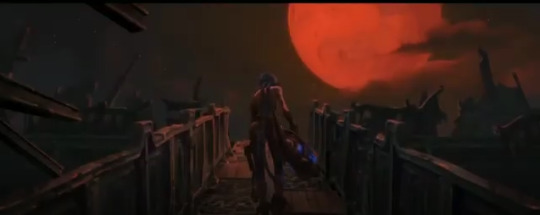
This song narratively takes us into Jinx's pov as this moment plays out. It is beautiful, and haunting. The key however, as we are hearing Jinx's perspective play out, is to remember that her mind is not well.
We have been watching her unravel more and more since the beginning of S1 A2. Think back to when she and Vi first reunite. She is clearly ashamed of what she has done with Silco. Put that up against her shooting at Vi even one episode later on the bridge.
2. She is still extremely fresh from the Shimmer procedure that even though it saved her life was horrific and painful to the point it could have killed her.
3. She abducts Caitlyn nude from her bathroom and tells Vi she be Powder again if Vi will just murder Caitlyn.
4. She kills Silco in the middle of a breakdown
5. Quite frankly. The whole "dinner party" itself. There is not a damn thing in the world about her behavior or mental state at this time that suggests she is level or even. Her sudden calm after killing Silco isn't a patricide induced clarity. It is a breaking.
She is angry, she is grieving, she is ill and she is afraid. She feels that Vi cannot love her anymore because of who she is and she killed the only other person she had. So she lashes out. And in so-doing actually obliterates her peoples chance of independence.
Intent:
Now I have seen the argument made that it doesn't matter what her reasons or intent were. Because ultimately her actions served Zaun. Did they though?
Blowing up the building and killing six enforcers caused the bridge blockade Her attack on the bridge almost killed Caitlyn, which all personal character bias aside, if she had successfully caused the death of a council woman's daughter Piltover would have gone nuclear. She also almost killed Ekko successfully who was actually a champion for Zaunites. Her attack on the council opens the door for Ambessa and kicks off the events leading to Caitlyn's strike team and the occupation. The most obvious and one that should be taken with a grain of salt given the extenuating circumstances. But Jinx was a part of Silco's operations. Piltover's neglect and oppression may have allowed bad men to rise up and take control, but Silco was their chief. He flooded the lanes with Shimmer regardless of the harm and Jinx played a part in that.
SEASON 2
Alright, moving into season 2. This is where people were angry and feeling that the show was throwing away Jinx's revolutionary arc. But as I've stated it is my belief that is never where her story was going to begin with. So let's dig into some points I feel lend themselves to this point.
Aftermath of Jinx's attack:
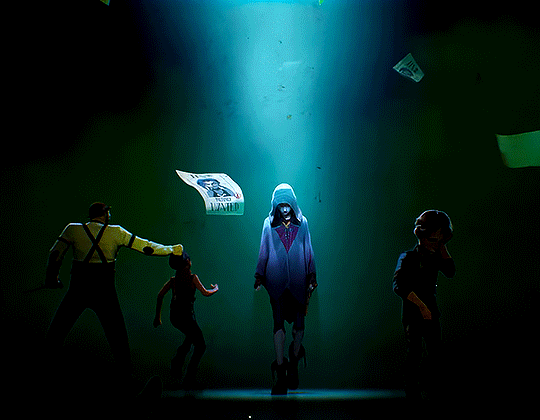
What is she doing in the wake of her first strike? Leading battle planning sessions? Nope. Wandering the streets while Chem-Barons rip Zaun apart. Why? Because she wasn't firing the first strike. She was breaking down. And now she is all alone. Her adopted father gone, his organization failing, her sister lost to her.
Ventilation Chamber Battle:
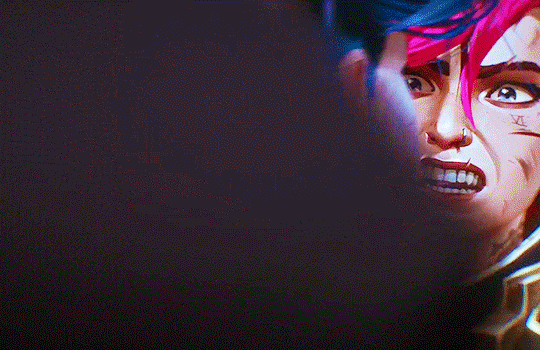
Alright so I see this battle mentioned as well because Jinx and Sevika let The Grey loose in Piltover in retaliation. I wasn't sure if I should discuss this or not, since some people like to pretend Jinx never did this and I don't want to confuse them. But better to be thorough.
As I'm sure you know this is the battle when Vi & Caitlyn finally confront Jinx & Sevika down in the pipeworks of Zaun. They all engage in a massive and brutal brawl to some truly outstanding music, and in the end Sevika detonates a series of charges that send the Grey up into Piltover all over the city.
I have spoken AT LENGTH about the hyperbole and nonsense the fandom has engaged in when it comes to The Grey and Caitlyn. I can assure you I'm not going to magically assign it some ultra-lethal quality just because Jinx is now doing it.
"Jinx was acting in retaliation against their oppressors for Caitlyn's strike team poisoning Zaun's air!"-- You get the idea
The issue of course is that this was not some strategic retaliation in Jinx's rebellion. This was intended to be her suicide and end Vi as well. Jinx wants to die here.
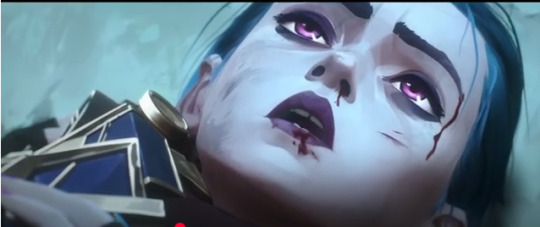
Hard to lead a rebellion when you intend to die at your sisters hands. However I will give Jinx partial credit if that makes anyone feel better. She was at least retaliating against Piltover as well.
Becoming A Symbol:
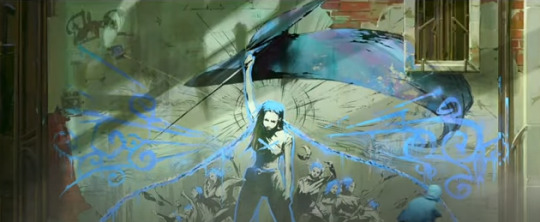
Alright. This is where we get into Zaun trying to force her into this box as well. Let's do a very quick rundown of events leading up to the occupation of Zaun under Martial Law:
1. Caitlyn leaves Vi after the battle and becomes the commander 2. Caitlyn and Ambessa's forces hunt Jinx throughout Zaun, cannot locate her. Place Zaun under Martial Law until she is caught and try to get Zaunites to turn on her 3. Zaunites make Jinx their symbol of resistance. Their flag to rally behind. Even the spy Maddie says "we made them desperate for something to believe in".
And what has Jinx been doing the entire time?
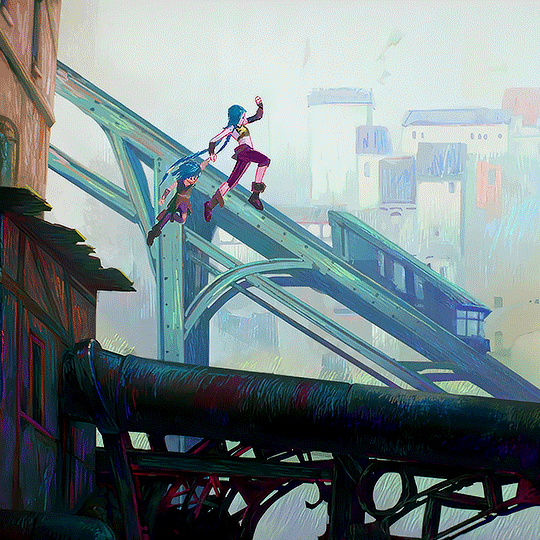
Which by the way. AS. SHE. SHOULD. She finally found some fucking peace and happiness. But she was not in any fashion out throwing Molotovs and getting arrested. She did not become the symbol of the rebellion because she earned it. She became the symbol because she's the one they had when they need something to believe in. Even when she frees all those people from prison she only does so because she is trying to rescue Isha. And by the way the show is not subtle about what this means for her:
She and Isha are living happily-
When Sevika comes in angry and slamming things and demanding Jinx consider what Silco sacrificed (aside from Jinx's second family of course) Jinx starts glitching and yells.
2. Jinx tearfully admits to Silco's chair she doesn't want to mess up what she has with Isha
3. When Isha is taken and Jinx has no choice but to rejoin the fight, the show is quite clear about the tone it sets for Jinx.
Pop Quiz class, does it seem like they are implying its a good thing?
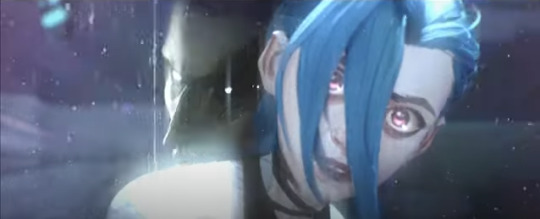
Side Note:
Jinx has too many barbs, comments, taunts and so on to name regarding her feelings for Piltover. I didn't include them because… duh? She hates Piltover and she hates Enforcers. Again. That is not the same as being a revolutionary. Not to mention at the least in the context of her talking shit to Vi for putting on the badge, it should be noted that all you usually have to do is go a few words in either direction or consider the actual context and her clever jabs at her sister lose some of their luster.
"I busted half of Zaun out of prison while you were passed out in the bottom of a mug" INITIATING TRANSLATION FROM JINX-SPEAK TO REALITY….. "While you were in a self-destructive spiral that was probably going to kill you and caused among other things by my actions as well, I was chilling with Isha during the entire occupation until she went full feral gremlin and got arrested. I freed the others while I was there to get her also"
And that isn't hating on Jinx by the way. But people like to use all her clever little comments to really sell this whole image of her character and justify screaming about her not leading the massacre of Piltover or something at the end so it seemed worth mentioning.
Conclusion
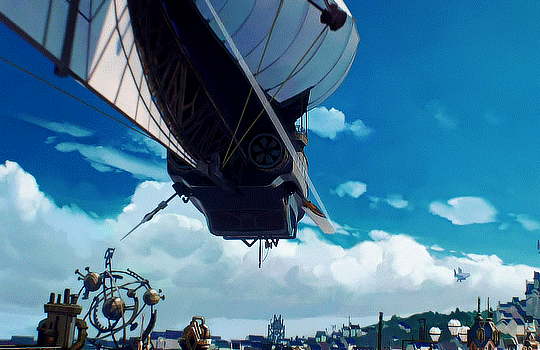
So. When it is all said and done, why even touch on this? Because I think people so stuck on wanting her to be a revolutionary for Zaun are missing the point. Sure her feelings were there, but the actions she took were never for Zaun's freedom. That isn't her story, just like it isn't Vi's. People watched this show expecting everyone to follow traditional heroic journeys. But not every character is meant to become the leader on the throne. Sometimes, they are the long suffering victim of a system that doesn't really care about them, and although they can fight for and defend their people, their greatest victory is getting to live for themselves and their loved ones in peace.
Think about "Silco's" final speech to Jinx: Break free from these labels and restrictions. These "prisons". Walk away from the cycle because otherwise it will. not. stop. Like most of you I'm sure, I wanted to see Jinx and Vi together as sisters at the end of the show. And I have seen SO. MANY. comments saying it's bullshit that Jinx had to go off on her own so Vi could have a happy ending but these people are seriously missing the point.
Jinx not only gave Vi a chance at a happy ending, but she set off to find her own. She was never going to find peace in Piltover where no matter the circumstances, there were very real people living with the aftermath of her crimes. And she was never going to escape the shadow of Silco returning to Zaun, either being held to account for her part in his crimes or expected to lead their people. And that is to say nothing of the memories of everything she'd lost haunting every corner of Zaun.
I understand if her story wasn't what you wanted. We all had our own preferences and ideas and theories for how things were going to go. But by trying to force Jinx's narrative into a certain box and being angry at the parts that don't fit, you miss out on the story we were given.
A tortured but loving young woman who reclaims her soul, and sets off into the unknown to find her peace. Fulfilling the dream of a bright and inquisitive little girl who dreamed of better days.
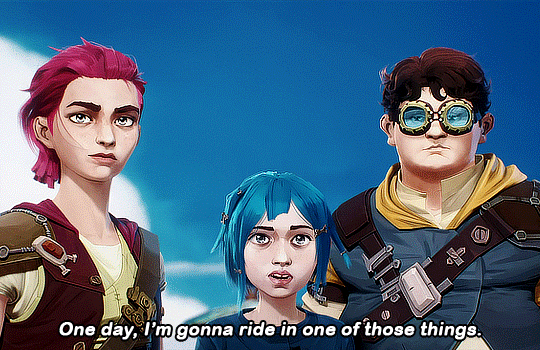
*** Yall Tumblr had a seizure right at the finish line and the formatting got all messed up and I wasn't really able to fix it completely. Sorry if this looks weird***
#jinx arcane#arcane powder#silco arcane#arcane vi#caitlyn arcane#arcane#arcane season 2#jinx and isha#arcane season 2 spoilers#vi and jinx
88 notes
·
View notes
Text
This series of four videos on Ukraine and the Russia-Ukraine conflict is very interesting. The first is basically just a narrative political history of Ukraine from about 2000 to 2014, talking about different political factions that were relevant in the country in the period, and how different internal and external pressures shaped politics. It's very helpful for understanding the Ukrainian political context, including just how recent and just how shallow the supposed tensions between monolingual Russian and bilingual Ukrainian-Russian speakers was in 2014.
The second video is an overview of the Donbass war from 2014-2022, which you might have been vaguely paying attention to at the time. But it's very helpful to have it all laid out in chronological order with the benefit of hindsight, especially due to the obfuscation of Russian operations at the time that made it hard to work out what, exactly, was going on. It's a combination of a good old 19th century-style filibuster (the military expedition, not the parliamentary maneuver), Fox News-style propaganda, and some (rather badly failed) attempts at astroturfing civil unrest--why Russia thought that would work becomes important in Part 4.
Part 3 is just an extended argument that NATO expansion is not relevant to the 2022 invasion of Ukraine, and while I already agreed with that assessment, it's nice to have it laid out in detail. The very very short version is that by NATO's own public criteria, Ukraine was simply not a candidate to join NATO, and had given up on joining NATO, and that had been painfully obvious since at least the Obama administration. Even more frustratingly, there were multiple points where Russia had an offramp to escalation, where it had gotten everything it could have possibly wanted from the conflict in Donbass, and it refused them all.
Part 4 is the author's attempt to explain why it refused them. The very short explanation is that Russia's government is led by idiots, who are very enamored of a flavor of conspiracy theory that has its origins in the LaRouche movement, and which has been bubbling in both left-wing and right-wing circles since 2000. In this worldview, the US government acting through the CIA (or the British royal family, or George Soros, or Jewish bankers, or whoever your bogeyman of choice is) has an almost supernatural ability to overthrow any government on earth by funding performance art groups (seriously), civil society NGOs, and protestors, and that almost every revolution, actual or so-called, since 1989 has been their direct work, from the post-Soviet revolutions, to Euromaidan, to the Arab Spring.
This belief, in its more overt or fragmentary forms, is incredibly popular, spurred on no doubt by historical instances of CIA malfeasance and actual aggressive wars waged by the Bush administration. But the problem is, it's bunk. During Russia's initial moves against Ukraine in 2014, they tried essentially the same playbook in the Donbass, and of course it failed miserably--you cannot actually astroturf a popular uprising. (The CIA has preferred to stage coups and assassinations, which are a different animal from color revolutions.) The separatists in the Donbass eventually had to be supported by a few thousand Russian troops and direct military aid.
But Putin, driven by his own paranoid misunderstanding of world events, the clique of yes-men he has embedded himself in, and his fear of gay Nazi Jewish CIA agents, simply got Russia in over its head. There is no offramp because Russia cannot articulate what its goals are, and because "stop trying to use George Soros to overthrow the Russian government" is not something the US can agree to, since they are not doing it. The only thing that might have prevented Putin fucking with Ukraine in the first place was maybe if rigging the parliamentary election in 2011 hadn't resulted in protests, in which Putin saw the specter of the hand of the CIA--but of course the US and NATO and the EU had nothing to do with that!
And to cap it all off, since the 2010s the LaRouche movement and its theory of color revolutions has been making inroads in China, so we have that to look forward to in coming decades.
275 notes
·
View notes
Text
Herbert West Drabble: Being stuck at a Busstation with him while it rains
I watched the movie for the first time and now I already have three Wips for him I‘m working on
Content/Warnings: Gender neutral Reader

You were seated under the roof of an old, wooden Busstation and watched the trees bend and sway to the strong winds that whipped through the empty street. The humid summer air had suddenly been disrupted by a burst of rain that was still relentlessly pouring down on the small shelter that was this bus station. Thankfully you were already close when it started, you only got a little wet.
It would take a while for your bus to arrive, so you just quietly listened onto the drumming and tinkling noise. At some point though, you spotted a man swiftly walking towards the Busstation, sheltering his bag under his suit jacket rather than using it to cover himself. That was why he was already pretty soaked when he made it under the roof.
He had black, short hair, glasses and wore a shirt and tie combo that was now fully sticking to his body. You smiled at him with some sympathy, he nodded at you and took a under the bench as well.
You put your bag on your lap and rustled around to find something, shortly after you handed him a handkerchief. „For your glasses.“ You imagined it was pretty hard to see with rain stained, fogged up glasses. „Ah“ he took it and took his glasses off to clean them, revealing dark, very dark eyes beneath that briefly met yours before polishing his glasses. „Thank you.“ He muttered, frowning down at the specters with a concentrated look in his face.
„You must really like your work if you are trying to protect your bag from the rain instead of yourself.“ You joked lightly, putting your own bag to the side again. Herbert looked up, „Like..?“ he paused, „well, you could say so. But most would rather call it Obsession.“ He huffed and put his glasses back on. He handed you the handkerchief back, the way your fingers closed around the fabric mirrored his own, you were looking at him though. „Is it Obsession or Possession?“
Herbert looked up at that, letting go of the handkerchief and now it was you who didn’t look as you were putting it away. It struck him, the phrasing, yet you just lightly smiled like it was nothing.
„Both, probably.“ He said. He liked to think that he was in control of it all, that he was the constructive agent of a scientific revolution. Exceeding not only research but pre-existing beliefs about death itself in the world. But then again there was failure he hated to acknowledge, like the Death of Dr. Gruber. The state he slipped into when he needed a shot. So both, probably.
„What about you?“ He turned the question back at you. He didn’t really care to hear about other peoples lives, he was more occupied to beat Death than to get to know the living. But the question, that weirdly precise phrase, made him a bit curious about your answer.
„I think I may be too idealistic to enjoy the work I‘m doing now, maybe my expectations are too romanticized. I want to do more than all of what is within reach of me right now. But I don’t really have a choice.“ You laughed.
Strangely enough he understood, in a way. Always feeling like there was more to be done, more to archive only to be halted by the somber limitations of his environment. He responded with a hum.
You shivered, wrapping your arms around your body in an attempt to combat the sneaking cold. A strand of hair fell in front of your eyes, but you kept looking out into the rain. Observing it. And Herbert looked at you, and the way there was something so attentive and imaginative in the way you were watching Nature bend and wrestle with the wind and rain. He looked at things the same way, but with different intentions. Everything had a reason, a purpose, and he was determined to put the pieces of his environment together into something he could make sense of or use.
And he saw purpose in you, somehow. And he ached to make sense of it, to grasp how something about you resonated with the Drive that led him to do all of these things. You were very different from him, but your perception seemed to overlap with his in some places.
You heard faint rustling, and looked up in surprise when you saw him gently putting his jacket around your shoulders, careful not to come too close. Herbert held your gaze. You sighed without noise, feeling that it slightly helped with the cold.
„Maybe you can do more.“ He pulled a business card out of his pocket and handed it to you, „My name is Herbert West. Would you like to be my Assistant?“
- - -

I hope you liked it even though this was really short! Please comment to let me know <3
#gender neutral reader#herbert west#herbert west x reader#re animator#re-animator#reanimator 1985#reanimator x reader
65 notes
·
View notes
Text
I don't think we give enough credit to how funny and scathing the fact is that, 10,000 years in the future, when humanity has expanded to countless other planets throughout the galaxy, and there are necromancers who can slay the vengeful specters of celestial bodies and cross through dimensions, no matter what planet we are on us regular folk are still sitting in cars stuck in traffic. The revolution on New Rho won't be televised but will be keeping a close ear on the radio for any problems taking out lanes on the freeway and what's a good alternate route to go kill god
31 notes
·
View notes
Text
The Pale is a haze that bends and warps reality and memory. It is a grayness into nothingness, impossible to describe or measure, a location without a defined location, into which one’s memories scramble with other’s and no one’s. It is filled with information from the past, but none that is clear, instead degraded like that of the damaged tapes found in the game. Traveling through it is dangerous. Reality is suspended, and one’s brain becomes garbled as one ceases to be able to remember what is the present and what is the past; what are one’s memories and what are not. It encases the game with a sense of oncoming apocalypse, as the majority of the planet is covered with it, and worse, it is expanding. A parallel to both our own climate change, and our cultural stuckness, it represents the end. The end of the world, a slow and ongoing process; and the end (or more accurately, the edge) of possibility. Disco Elysium’s reality is bounded by a sea of nothingness, in the same way our own is, with no escape from the confines of capitalist reality imaginable.
What hope is there for such a dying world? A world exhausted of the new, ravaged by neoliberal austerity, and overflowing with suffering. In this capacity, Disco Elysium is no fantasy, but our own sad, warped reality. In his book Ghosts of My Life, Mark Fisher describes the concept of hauntology. Originally a term coined by Jacques Derrida, hauntology is an idea that can be understood as how everything that exists is defined not only by what is present, but equally so by what is absent (the word itself reflects this: ontology is the branch of philosophy that studies existence and being. In Derrida’s native French, the h in hauntology is silent, thus (h)auntology is pronounced the same as ontology). He argues that hauntological music, in how it engages with memory and loss, has “an implicit acknowledgment that the hopes created by postwar electronica or by the euphoric dance music of the 1990s have evaporated — not only has the future not arrived, it no longer seems possible.” For Fisher, the latter half of the twentieth century represented a bursting forth of possibilities, with different cultural forms, in what he terms “popular modernism,” were allowed to experiment and expand, in large part due to post-war social welfare policies. With the closing of that period, and the dawning of the so-called “end of history,” such possibilities were drained away. Where once there was a hope for the future (whether in art or in politics), now we have only repetition and despair. In other words, to use his only terminology, these futures are lost. Yet, unlike the bubble gum optimism that neoliberals push, Fisher argues that this kind of sadness can be understood to be productive. In holding onto the desire for the future, rather than it being seen as some kind of conservatism or hopelessness, Fisher argues that “this refusal gives the melancholia a political dimension because it amounts to a failure to accommodate to the closed horizons of capitalist realism.” Sadness and holding into past desires for such lost futures, is political, and imperative, as it sustains the hope for something else, an alternative to that closed off reality that we live in under capitalism.
Disco Elysium exemplifies the kind of melancholia that Fisher talks about. The failure of the revolution is a lost future that weighs down the whole district. Despite the absence of the reality of communism in Martinaise, it exerts a strong presence like nothing else. Fifty years on from its defeat, it’s as if time has failed to really move on. In other words, the failure of the revolution haunts the area, the literal specter of communism can be found everywhere. Many of the other failures of the future can equally be ascribed to politics and the economy. Would any of the misery that surrounds Martinaise’s citizens be present if not for neoliberalism? It’s hard to say, but that ambiguity is what makes hauntology so powerful. It engenders feelings of what if and other potentialities; possibilities that the official reality attempts to close off. The character of Cuno, for example, is a twelve year old drug addict. His father is dying of alcoholism and is left mostly to his own ends, which leads him to all sorts of mischief and crime. It’s noted in the game that Cuno has potential, given the correct choices, it’s even possible for Cuno to take the place of your partner. Yet, for the most part, it only remains that: a potentiality. Cuno is just another poor soul, crushed in the grinder of neoliberalism.
284 notes
·
View notes
Note
There are two types of readers for your work: One wants to jail Selene for her crimes, stop the revolution, elope with your chosen RO. The other is gay. Selene is hot, and you yearn for sapphic tragedies. Get her therapy and better her non-life while you can. Abandon morals, you won't need any once you marry your ghost bride. Commit crimes together, establish free medical care for the shards, adopt an abyssal monster together. DO *NOT* STOP THINKING OF THAT SPECTER A SINGLE SECOND OF YOUR DAY. good.
Sometimes, they're both at the same time
You're correct. Jail is good, but have you thought of marrying her? 🫵 Nothing is better than a dead wife with questionable morals.
31 notes
·
View notes
Text
it's that time of year. I must give you spooky songs.
I'm not just throwing my playlists at you, either. you can find all 200+ of my playlists on my spotify. spooky is a blanket term, okay. the vibes are expansive but there's something...there.
spooky but in the background, mostly
the Ghost songs by Louie Zong
Ancient Souls - The Daniel Pemberton TV Orchestra
Edge of Night - Cullen Vance
The Mist - Max LL
The Inevitable Haunted House - Boqeh
Mass (Re-Imagined) - Phoria
Dispossession - SQUARE ENIX MUSIC
Ceaseless Watcher - harvo
Waltz of the Bone King - Peter Gaundry
Thryy Wyrd Tynns - Alec Holowka
Dance Off - Heloise Tunstall-Behrens & Auclair
Dragon Lullaby - Dave Volpe
The Gambit of Night - Neil DeGraide, Dirt Poor Robbins
Sleep - The Last Bison
Mausoleum - Rafferty
White Specter - Adrian Von Ziegler
spooky but there's something here with you, a creature?
Fangs - Little Red Lung
Rusalka, Rusalka / Wild Rushes - The Decemberists
That Unwanted Animal - The Amazing Devil
Into the Woods - PHILDEL
Into the Unknown - Evetty
The Nowhere King - The Centaurworld Cast
Aha! - Imogen Heap
The Glow - The Last Bison
Nature Girl - Cryoshell
Running with the Wolves - AURORA
Howling Moon - Coleman Hall
The Pines - Roses & Revolutions
Caterpillars (Of the Commonwealth) - Will Connolly
The Night We Met - Lord Huron
Errasuriz - Kiltro
Bloodsuckers - Johnny Hollow
We Have It All - Pim Stones
spooky but maybe it's you
Devourer - Aideoneus
When I Was Done Dying - Dan Deacon
The Yawning Grave - Lord Huron
So Tonight That I Might See - Mazzy Star
The Mortal Boy King - The Paper Kites
Stone Wall, Stone Fence - Gregory and the Hawk
Ghosts - James Vincent McMorrow
Oceanica - San Fermin
Going - Tow'rs
Sticks and Stones - The Pierces
Strange - Runah
All Things Devour - aseaes
Raise the Dead - RAIGN
Sunlit Grave - Saint Mesa
Remain Nameless - Florence + the Machine
spooky but we're having a good time, I think
Let's B Goblins! - Ratwyfe
Death, Thrice Drawn - The Scary Jokes
Great Vacation - Dirt Poor Robbins
Face the Night - Tennyson
Skeleton Song - Kate Nash
Bones - anne october
The Magic - Lola Blanc
All Is Well (Goodbye, Goodbye) - Radical Face
the jester - ratz
spooky but in pastels
In The Beginning - Fahrenhaidt
Kiss the Grass - The Paper Kites
Butterfly Water - Pastelle
I Was Feeling Down, I Found a Nice Witch and We're Friends - In Love With a Ghost
The Ancestor - Darlingside
Entangled Life - Merlin Sheldrake, Cosmo Sheldrake
Night Owls - Mree
27 notes
·
View notes
Text
as i say quite often, anarchist/ML infighting in the modern world is pointless -- it's just shadowboxing the specters of reactionary wreckerism / gulags and purges (delete as appropriate) in the aftermath of a purely imaginary revolution at a time when the capitalist state still exists and any mass revolutionary movement does not. just a total inversion of priorities--it's fighting over what to do with our chickens before we even have the eggs
266 notes
·
View notes
Note
I have been infected by your AU. As such, have thoughts.
The thing that catches Technoblade in the end is his empathy. That, more than anything, is what keeps him trapped.
He knows the others are androids. How could he not? He knows this. He knows everything about them, from their personality to their responses, is artificial. It's not real, it's an approximation of what would work best, an amalgamation of code and psychology all jumbled up in the most efficient attempts to make him stay. The guilt trips don't work, or at least they shouldn't, because there's nothing to hurt. No soul, no personality aside from what they manufactured.
But they do. They make him hesitate, every time. He knows ways to take out androids (all risky, hypothetical at best, but a chance), but they're the type of thing androids don't come back from. He can't take the thought of ToMM1's eyes blinking shut and never opening, the thought of PH1lZa's hurt and W1LbuR's bitter resignation when they realize the betrayal. (And really, that's assuming it works and there isn't something worse that comes of it. Failure is a specter of its own.)
He just. . . can't.
Because who is he to draw the line between artificial and true, between worth it and not, between person and tool.
Because really it can all be summed up in one line.
"I'm a person."
I'm going off of character Technoblade here and assuming his personality in the AU would be mostly the same. So he's the guy who tore down governments and thought they'd be fine, because all he could see were the people inside. The guy who stared down a kid who was supposed to be executed and saw just that. A kid, an ally, someone with friends and fears, not a threat. (Which in that moment Tubbo was, not in and of himself, but due to the circumstances around him. Tubbo was the linchpin which held Technoblade's life and the revolution on its back.) He's the one who fought so hard to be a person, only to never be believed. This is the man who knows how it feels to be a threat (The Blade) and how hard it is to be anything different when that's all you are to those around you.
And that's part of the tragedy here. Technoblade can't help but see them as real, as people. And they can't help but not.
Thanks to the programing, all they can ever see is a problem, a solution, a possession. Something to be protected, but only. Ever. Some. Thing.
While he can't help but see them as human, they can't help but see him as machine. A mess of inputs and outputs; made to be manipulated.
(As for possible AU names. . . Mechanisms of Captivity? Mechanisms of Trust? Machine AU? I don't know if any of these are what you were looking for, or if they'd work, but you asked.)
I've been thinking a lot about Techno in this AU, the sort of person he is.
I'm inclined to actually make him a bit younger. Think in the older teen ballpark (16-18 years old?). But very much still an anarchist. The thing about this AU is that even before the whole literal apocalypse started, it was basically a cyberpunk dystopia.
Through the advancement of technology and capitalism, as well as the environment being ruined and people's jobs being increasingly threatened by automatisation, the wealth gap has only become wider. The middle class is all but gone. There's only low income citizens struggling to get by (and often dying in the process) and the rich elite that rule everything living a cushy life full of luxury. Androids and robots are everywhere - service jobs, public transports, security, everywhere - but highly advanced androids with intelligence for personal purchase are really just a commodity for the rich.
Techno is an orphan, and he's been on the very bottom of this wretched society, trying to scrape by. An anarchist who hates the oppressive, controlling government, and hates androids by extension. He's a bit of a hacker (his bestie Skeppy even more so) and isn't unknown to the law system, though it's mostly petty crime, so him being a minor and his own resourcefulness has allowed him to stay out of real trouble. He's not upgraded to full on terrorism yet. Theft to get by, moving contraband around for money, sometimes street art or vandalism, that sort of thing.
(Maybe even a Robin Hood type vibe, steal from the rich give to the poor!)
But Techno has learned how to work around androids (again, security is mostly machine-based. Techno knows how to be tricky with them). And that's what saves his life when the killing machine apocalypse gets into full swing.
It's also another layer to his dislike for SBI. Techno is going to be even more hostile and distrustful towards them regardless of the apocalypse thing. And he knows androids are just machines, but it's hard when SBI are so humanlike...
And then again, they are the most advanced models ever. The bug has even further boosted their cognitive ability. At what point does one get personhood? At what point have these machines become people?
(Some people had other ideas but 'Mechanisms of Trust' is banger I'm stealing that /lh)
36 notes
·
View notes
Note
I googled the Belladonna of Sadness and: “To take revenge, she makes a pact with the Devil himself who appears as an erotic sprite and transforms her into a black-robed vision of madness and desire.” (Femto, the blessed king of longing) “The spirit visits Jeanne once again and rapes her in exchange for more riches“ (Gennon and Griffith) ”the baron offers to make Jeanne the second-highest noble in the land, but she refuses, saying she wishes to take over the entire world.” (Ok Miura HAD to have seen this, right? Wtf…Griffith…)
omg if you havent watched it check it out, check it out, check it out!!!!!
i think i read somewhere that Miura was inspired by it in writing Berserk? but i cant say that with full confidence...
but the parallels!!! the story goes even deeper than what you said! its been almost a year since ive watched it, so my memory of it is not 100%, but ill talk about what i can remember!
(spoilers ofc)
it contains incredible artwork and its set in pre-revolution France(remind you of another manga berserk was inspired by?) and it talks about a beautiful woman- The Most Beautiful Woman Alive!!!- who has just gotten married to the love of her life! but the marriage can only be made legal by the king/ the baron of the lands(an aristocrat of sorts i dont recall properly) who immediately as he sees her, takes her and rapes her. what should have been the happiest night of her life spent with her lover, is spent being defiled, helpless as she is to fight her fate; a poor powerless woman against the all powerful aristocrat. she becomes someone else; traumatised and desperate and her husband cannot look at her the same anymore. but amid all the grief regarding what was taken from her and how she was changed, arises a new emotion: rage. she wants power. she wants vengance. for every petal of hers that was wilted, she wants to birth a new thorn.
now if you're trying to draw parallels, ig this can be a perfect parallel with griffith getting tortured by the king. the helplessness and the toll of it all. the way how it affects his decision-making in the series.
but now as our beautiful woman is stuck in her bottomless desparate anguish, a new character appears before her: a small evil spectre! he looks her straight in the eyes and says. i am you. and you are me. give everything you have to me and i will grant you what you wish for: a chance to make things even. she is poor, she has nothing to give. so the spectre takes her body. defiles her the same way. and she is granted success. she is granted money. her husband and her reap the benefits of her new powers. now the aristocrat is feeling threatened by her status, tries to appease her-offers her lands and riches beyond a simple commoners imagination. but she, unbothered, responds:"money? lands? im not interested in something as small as that, beacuse im going to take over the world." appalled by her ambition, the aristocrat orders she be exiled as a witch, never to return. this whole time the spectre just grows bigger and bigger. stronger and stronger. the more she hates and gains and succeeds, the louder it roars. the more angry and resentful she becomes, the hungrier it grows. its goal: to break her strong spirit piece by piece, little by little. and when she is exiled and thoroughly broken, it reveals himself: he is actually the devil. he asks: what do you crave? he knows what she wants: power. she asks him to make her into a devil, into a wicked, ugly, wrathful woman who will strike fear into the hearts of anybody who crosses her. she doesnt want to be desirable anymore. her beauty was her cage, her curse. and thats what the specter does. transforms her into an all powerful demon.
but as she aweakens from the transformation, she notices that she has become lovlier, more desirable than she ever was before, an otherworldly, overwhelming type of beauty. she anguishes over this. asks for explanations. she wanted to be terrible, scary and full of rage and anger. to this, the devil responds: "who says that anger and rage cannot be beautiful?"
in berserk, this could be a parallel with the godhand offering griffith his option to sacrifice at his lowest point, and griffith's transformation into a devil -femto- and later into an otherworldly beauty - neo-griffith. there is nothing lovely or lovable left in him anymore, but he is the most lovely and beloved character by everyone in the show after his neo-griffith transformation. his power knows no equal and he strikes fear into the hearts of all who dare cross him. nothing will ever touch him again and nothing will ever be taken from him again, unless he wills it.
so she lives in exile, her otherworldly powers making her a diety of sorts, one people love and worship. one day, her husband, mad at himself and sick with love for her, goes to her to ask for her forgiveness. he couldn't save her when she needed him, and he couldn't protect her when she was taken from him, so all he does is ask for forgiveness. and amid her power-hungry, hatered spinning days of rage, she blooms with love for him, everything else thrown aside or forgotten. he was all she had ever wanted once after all. they fall into each other, one last time before tragedy strikes.
the aristocrat, terrified of her, her power, the support people gave her, orders for her to be burned at the stake. as the flames overwhelm her and she cries out one last time, the people witnessing the scene, cry out in uproar. they kill the king, avenge her and become a lingering flame in the calamitous fire of the french revolution. even though she is no longer there, she achieves exactly what she wanted- vengence against those who wronged her, and world domination, as the uproar from her tragedy, is what kickstarts the world to change.
now the whole parallels with griffith i made clear in italics, but there i dont think that thet is where the parallels with berserk end. there is another character, whose case could be argued, might have been inspired by this movie: casca. the unfortunate fate of the woman, the defilement and heartbreak she experiences because of conditions she cannot control, her story is drowning in them. i believe, if Miura was indeed inspired by this movie, that casca's story takes root in this unfortunate fate this character suffers through, but the only element present in casca's story is the heartbreak and pain, the rage and vengeance part is yet to be seen.
this movie seems to overlap both of these characters journeys, emotions and characterisations. if i have made a post about their alikeness before, this movie would be the main thesis for it. they switch roles and imagery within this "belladonna" character to the point where you cant make a case for one without mentioning the other. he becomes a demon, she becomes a witch. he falls in desperation, she falls into her lover's arms. he takes over the world, she gets burned at the stake. he gets the purpose, she gets the tragedy.
overall, berserk or not, belladonna of sadness is a beautiful story and 100% worth the watch. it contains some of my favourite lines of dialogue and scenes ive ever seen in animated media. its experimental and different, but man, isnt it captivating. WATCH IT!!!
#belladonna of sadness#is a story about the role of women in the french revolution. they were the first ones to rise to the occasion. this movie is an ode to that#kanashimi no belladonna#berserk#griffith#casca#sorry for the rant#if you dont want spoilers dont read after the (spoilers) part#my posts#berserk meta
33 notes
·
View notes
Text
more uv@eot shit
this is gonna feature words that dont rlly make sense unless you've read the rest of the manuscript
THE LOST AND FORGOTTEN ARTS
All Martial Arts are mostly banned, save for a few practiced and allowed by the PANTHEON for sport. Martial Arts are culture, you see. Culture not approved by THE PANTHEON is pushed to the margins.
And anything not approved by the Pantheon is the whole of humanity.
Here, drink this. That’s it. Hard to go down, huh? Yeah, haha, fucking–you’ll get used to it. You have to. That’s AMRI, it heals all wounds, it's made from the Semen of the God of the Binary Star we orbit. RIT, the last star before all the suns fade. They try to call out to us, you know? The solar flares scramble the Meta-Consciousness and fuck up the systems in The End.
It’s expensive as fuck, can only be bought by the Gods. How’d we get them? By fucking stealing them of course. How else? We destroy shipments, grab them back. We never get caught. We’re good like that. You, though? You’ll fuck it up. Unless you stick around.
You’re a ROOKIE aren’t ya? There’s a lot to learn about the THEATER OF SUBLIME VIOLENCE. That’s what we like to call this whole charade. Yeah, that is the term for the gladiatorial sports as well. For the Gods it might just be sport, but for us it's our entire lives. We spend our entire lives in violence, struggling to get out of hell.
Here’s the secret, Rookie. There’s no getting out of Hell.
So what do you do when you can’t reach heaven? You destroy it. “It’s easier to imagine the end of the world than the end of capitalism,” they say. So end the fucking world. Become the apocalypse. Some say this shit is depressing and defeatist as fuck, but I don’t think so. For the next world to be born the current one must be destroyed. It takes a helluva a lot of hope to get there. Let me teach you the ropes. You probably have some fighting knowledge, right? Everyone does, here in hell. Throw a punch, a kick? Yeah, that’s good. Gimme a grapple? All right, good enough, you gotta apply some more pressure around my neck but you’ll get the hang of it. That’s enough. Let’s get you to a Martial Commune. That’s where you’ll learn the ULTRAVIOLENCE ARTS. We like to call it just UV ARTS.
You ever heard of THE HEAD OF MARX?
THE HEAD OF MARX
Named after the economic thinker, the Head of Marx puts in mind the sleek plausibility of revolution. To be inducted into this art, you must recite the Communist Mantra and have your skull broken apart with anticapitalist enlightenment, then sutured back together to become a silver kintsugi, with threads of nano-mantra-wires made by the Monk Shatrasattva of the Broken Mountain Range, a well known Marx-Dharmist. The Head of Marx makes your head thicker than most. You become fucking determined. Your main attacking tool becomes your HEAD, you slam it down and destroy and kill the specter.
Art Traits
Posture: 3
Speed: 4
Style: Raider/Sentinel
Determination: When you describe yourself canceling out a Hit with your Skull, inflict Push 2 on one of the attackers, and then give them your Provoke 1.
Philosophical Juggernaut: When you make a close attack and describe yourself using your Skull, gain 1 Deflect Token. 1/Strike.
Impenetrable Power of Communism: At the start of your Riff, choose a square adjacent to you. Any attack that starts from that square or has a line of effect that goes through that square suffers Dullness as your burning Skull faces that direction.
MINOR MASTERY: THE HEAD
Things will never be the same.Your head has been shattered apart, and put together again. Your eyes are concetric bifocals to continue the Proletariat revolution. It is only through economic upheaval can everyone blast open the gates for the Path of Enlightenment. And once done, there’s still work to do.
For 1 Beat, you can use your head like a hammer. Make a Close Heat Attack, and then give the target a Knockdown 1 or Push 3.
EXCEEDS:
TRIPLE SKULL: +1 Beat to make the attack a Blast 3 Heat Attack.
ULTIMATE KILLING RHETORIC: Gain a STRENGTHEN TOKEN after the attack, and then Rush 1.
178 notes
·
View notes
Note
this might be a big ask, but do you know of any fantasy adventure RPGs that does idk fantasy napolionics, not nesesarily actual napolionics with fantasy elements, but sorta 18th very early 19th century tech + magic and other fantasy stuff, pre/peri-industrial but only just, whfrpg leans (allover the place but) earlier, and a lot of other fantasy stuff with guns leans eather Piracy, or steapunk?
THEME: Fantasy Napoleonics.
Hello friend, there's a lot of different elements going on here, so I"m casting a pretty wide net to show you what's out there. I hope something in here strikes your fancy! I primarily looked for games that felt like they fell within the right time frame, but I also threw in some games that maybe fall just outside your parameters in the hopes they spark something for you.
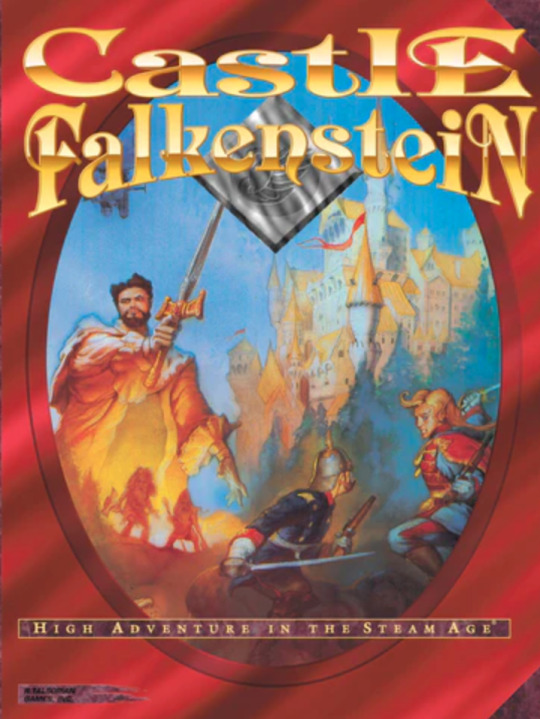
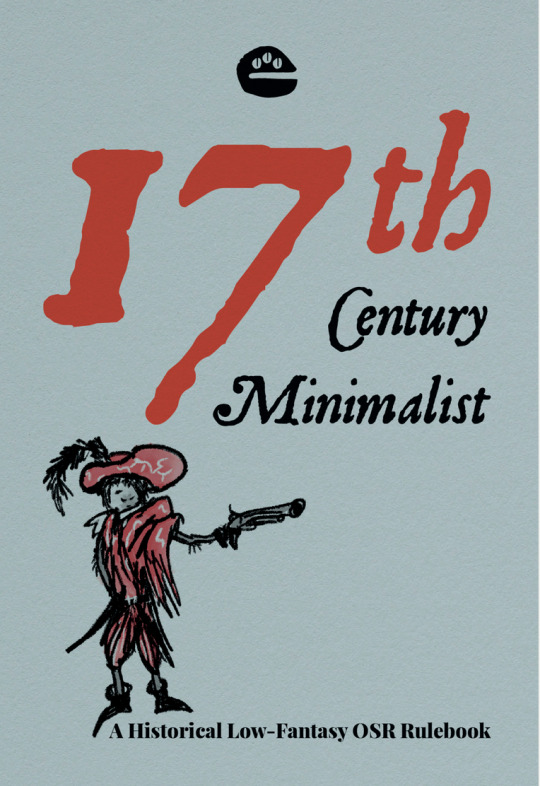


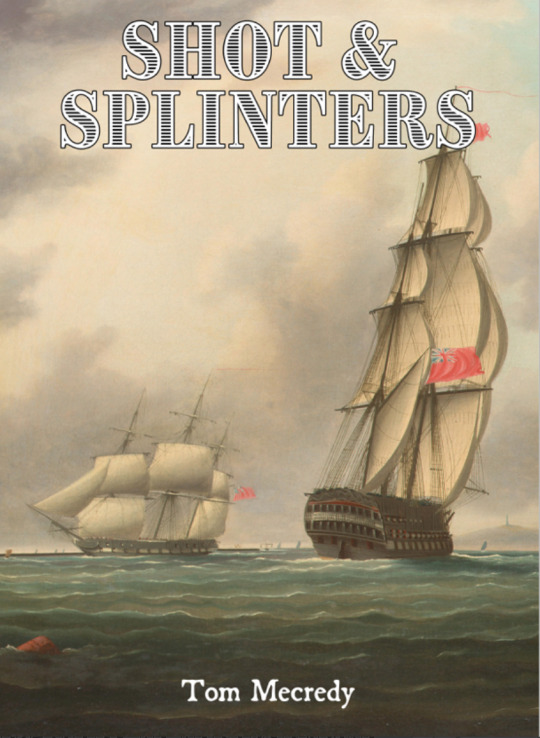
Castle Falkenstein, by R. Talsorian Games.
When computer game designer Tom Olam found himself sorcerously shanghaied by a rogue Wizard and a Faerie Lord, little did he suspect that he would soon become the pivotal force in the struggle to control an alternate Victorian Universe. But before the deadly game could end, he would first have to battle gigantic Landfortresses, outwit Dragons, romance a beautiful Adventuress, and defeat the Evil legions of a Dark Court determined to destroy him at all costs. Then maybe, just maybe, he could find a way home again …
Originally published in 1994, Castle Falkenstein is set in the Victorian era, but with a magical twist. This is a world of swashbuckling and adventure, complete with elves, dwarves and magic - but also submarines, Sherlock Holmes, and England’s courtly sensibilities.
There’s going to be many different kinds of roleplaying options in this kind of game, including combat, feats of derring-do, and diplomacy! The thing that possibly makes this game a bit far from what you’re looking for is the ruleset. Rather than using dice, this game uses a deck of cards, with different suits being suitable for different tasks, while card value determines skill or difficulty.
When it comes to setting, however, you’re going to have a lot of great things to look at. The supplements for this game include The Lost Notebooks of Leonardo da Vinci, Curious Creatures, Steam Age, and more!
17th Century Minimalist, by Games Omnivorous.
Welcome to the 17th century minimalist.
This is a fast-paced and highly-deadly game with a pinch of black humour that puts characters as wanderers in 17th century Europe. You will play as tricksters, thieves, former soldiers, bankrupt swashbucklers and petty physicians, roaming the Old Continent in search of coin and glory. The system is designed to allow fast character creation, compatibility with other games (mostly in the OSR community) and a reckless style of play.
The closest thing to magic in this game is an illusionist, but that doesn't stop this game from pushing your imagination. Games Omnivorous is pretty well-regarded in the OSR community. 17th Century Minimalist is meant to be simplified, fast-paced, and deadly, with technology like flintlock fire-arms, and goals like searching for treasure and glory. If you want to see a fuller review of this game, I’d recommend looking at Questing Beast’s video that covers the rules and the layout of the game.
A Guide to Casting Phantoms in the Revolution, by World Champ Games Co.
A Guide to Casting Phantoms in the Revolution is a single-session roleplaying game, in which players work together to summon specters to fight the aristocracy during the French Revolution. Featuring the pentacrawl system, Guide is different every time you play. Played on a story map in the shape of a pentagram, create a cast of characters, interpret symbols to create unique moments, and have the phantoms do you bidding—or you’ll do theirs!
This is a game with a number of physical, in-person components required to play. However, if you just have the pdf, the creator also directs you to online resources that you can print for the full experience. You are members of a secret cabal, casting phantoms to help you fight. This is a game that evokes the feeling of a ritual, and might feel magical or personal depending on how you play. It’s a strange mix of thematic storytelling and complex mechanics, so it might not be for everyone, but if you want to feel like a cult enacting revenge through eldritch rituals, I’d recommend checking this out!
Tales from the Aerosphere, by EfanGamez.
Tales from the Aerosphere is an original steampunk TTRPG that is powered by the Neon Nights system, a system that prioritizes seemingly limitless character creation freedom. From medics, to assassins, to mechanics, to a literal barbarian, there are THOUSANDS of character combinations you can play in Tales from the Aerosphere.
This game has its own setting, but all of the set pieces could be dropped, altered or changed if you like. The focus on this game is on character creation: the creator has outlined a number of discrete parts that you can use to not just put a unique character together, but tell you something about the world you’re in. If you’re a Spy, then there’s some kind of international conflict that hasn’t blown open into full-out war yet - perhaps there’s technology being developed that some nations don’t want others to learn about.
The game is extremely steampunk, with airships, CogWare that gives you exceptional abilities, and Tesla technology. It’s going to be on the more fantastical side of things, so if you really want to immerse yourself in another world, why not give it a go?
Shot & Splinters, by Tom Mecredy.
Shot & Splinters is a tabletop roleplaying game of naval adventure, inspired by Horatio Hornblower, Aubrey & Maturin, and Richard Sharpe. Drawing on history but not beholden to it, the game is set against the backdrop of the Napoleonic Wars, thrusting your characters into the heart of the conflict.
If you want seafaring and piracy, this is probably the game for you. It’s set in a napoleonic time frame, but it has strange creatures located upon uncharted waters. The mechanics are OSR, so expect simple stats, tables upon tables of gear, and a hex crawl map of the uncharted seas. If you want more adventure in this world, you can also check out Beneath the Battlements, a city crawl that brings your characters through a city under invasion. Honestly, I think this game might be the closest on the list of what you're looking for in terms of technology level, and possibly theme.
Games I’ve Recommended in the Past
Lady Blackbird, by John Harper.
#dnd#historical games#steampunk#game recommendations#indie ttrpgs#tabletop games#asks#there's a lot of wide-reaching stuff here
64 notes
·
View notes